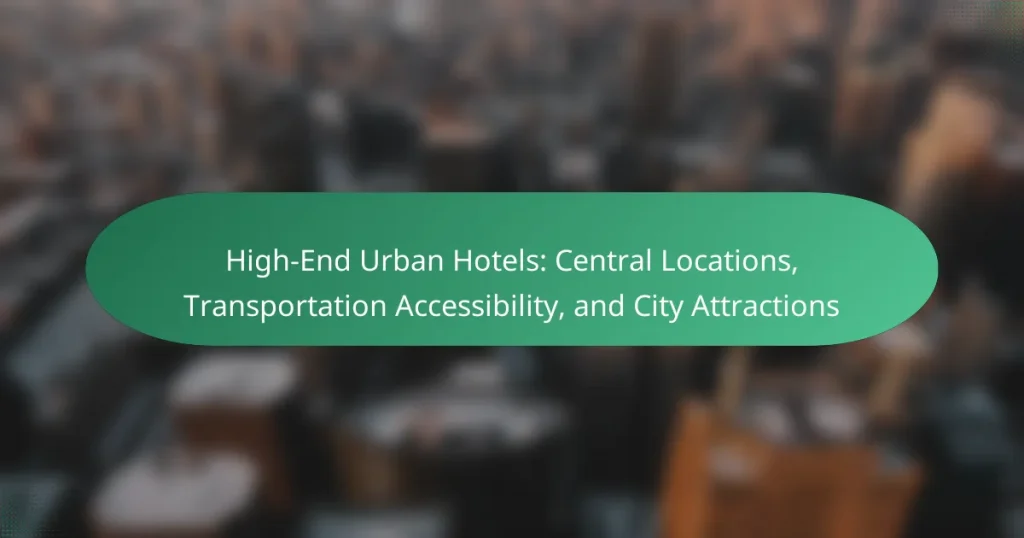High-end urban hotels are luxury accommodations situated in city centers, designed to meet the needs of affluent travelers. These hotels provide premium services, including upscale dining, spa treatments, and personalized concierge assistance, all while being conveniently located near major attractions and cultural landmarks. With a focus on unique architectural designs and sophisticated interior decor, high-end urban hotels cater to both business and leisure guests, often featuring state-of-the-art meeting facilities. The global market for luxury hotels is anticipated to grow significantly, reflecting the increasing demand for these upscale urban experiences.

What are High-End Urban Hotels?
High-end urban hotels are luxury accommodations located in city centers. They offer premium services and amenities tailored to affluent travelers. These hotels typically feature upscale dining options, spa services, and personalized concierge assistance. High-end urban hotels are strategically positioned near major attractions, shopping districts, and cultural landmarks. This accessibility enhances the guest experience by providing convenience for exploring the city. Many high-end urban hotels also emphasize unique architectural designs and sophisticated interior decor. They cater to business and leisure travelers, often providing state-of-the-art meeting facilities. The global market for luxury hotels is projected to grow significantly, reflecting the demand for high-end urban accommodations.
How do High-End Urban Hotels differ from standard hotels?
High-end urban hotels differ from standard hotels primarily in luxury, service quality, and amenities. High-end hotels often feature premium furnishings, upscale decor, and spacious rooms. They provide personalized services such as concierge assistance and 24-hour room service. Standard hotels typically offer basic accommodations with fewer luxury touches. High-end urban hotels are often located in prime city areas, providing easy access to attractions and transportation. They may include exclusive features like fine dining restaurants, spa services, and fitness centers. According to a 2023 report by Smith Travel Research, high-end hotels achieve higher guest satisfaction ratings due to their superior service and facilities.
What key features define a High-End Urban Hotel?
High-end urban hotels are defined by luxury amenities, exceptional service, and prime locations. These hotels typically offer spacious rooms with high-quality furnishings. They often feature fine dining restaurants and upscale bars. Many have wellness facilities, including spas and fitness centers. High-end urban hotels provide concierge services to assist guests with personalized needs. They are usually located near major attractions and transportation hubs. This accessibility enhances the overall guest experience. High-end urban hotels often prioritize design and architecture, showcasing modern aesthetics.
What amenities are typically found in High-End Urban Hotels?
High-end urban hotels typically offer a range of luxurious amenities. Common features include upscale dining options, often with renowned chefs. Many provide state-of-the-art fitness centers and spa services. High-speed internet access is usually available throughout the property. Guests often enjoy concierge services for personalized assistance. Valet parking is frequently offered for convenience. Rooftop bars or lounges are common for stunning city views. Additionally, high-end hotels may include business centers equipped with modern technology.
Why are Central Locations important for High-End Urban Hotels?
Central locations are crucial for high-end urban hotels because they enhance accessibility and attract affluent guests. These hotels benefit from proximity to key attractions, cultural landmarks, and business districts. Guests prefer staying in central areas to minimize travel time and maximize experiences. High-end urban hotels in prime locations often command higher room rates due to increased demand. According to a study by Smith Travel Research, hotels in central locations can achieve occupancy rates up to 15% higher than those in peripheral areas. This trend underscores the financial viability of central positioning for luxury accommodations.
How does location impact guest experience in High-End Urban Hotels?
Location significantly impacts guest experience in high-end urban hotels. Proximity to city attractions enhances convenience and accessibility for guests. Guests prefer hotels near cultural landmarks, shopping districts, and dining options. This accessibility often leads to higher satisfaction rates among visitors. Studies show that 80% of travelers prioritize location when booking accommodations. Additionally, easy access to public transportation reduces travel time and stress. Hotels located in vibrant neighborhoods often provide a more immersive local experience. Overall, a strategic location contributes to a memorable stay in high-end urban hotels.
What are the advantages of being in a central location?
Being in a central location offers several advantages. Central locations provide easy access to major transportation hubs. This facilitates convenient travel for guests. Additionally, a central location places hotels near popular city attractions. Guests can easily explore cultural sites, dining options, and entertainment venues. Proximity to business districts also benefits corporate travelers. Studies show that guests prefer hotels within walking distance to key locations. This enhances overall guest satisfaction and encourages repeat visits. Central locations often result in higher occupancy rates for hotels.
What role does Transportation Accessibility play in High-End Urban Hotels?
Transportation accessibility is crucial for high-end urban hotels. It significantly influences guest satisfaction and overall hotel performance. Convenient access to public transportation and major roadways enhances the attractiveness of these hotels. Guests prefer locations that minimize travel time to key attractions. This accessibility often leads to higher occupancy rates. Additionally, it allows hotels to charge premium rates. A study by the Cornell University School of Hotel Administration found that hotels near transportation hubs saw a 15% increase in bookings. Thus, transportation accessibility directly correlates with a hotel’s success and guest experience.
How do High-End Urban Hotels cater to guests’ transportation needs?
High-end urban hotels cater to guests’ transportation needs by offering various services and amenities. They often provide complimentary shuttle services to key destinations. Many hotels partner with local taxi and ride-sharing services for easy access. Valet parking is typically available for guests with personal vehicles. Some hotels feature on-site car rental services for added convenience. High-end hotels may also provide transportation information and assistance at the concierge desk. Additionally, they often have convenient access to public transportation options. These features enhance the overall guest experience by ensuring seamless mobility within the city.
What types of transportation options are commonly available near High-End Urban Hotels?
High-end urban hotels typically offer various transportation options. Commonly available options include public transit systems, such as buses and subways. Ride-sharing services like Uber and Lyft are also prevalent in urban areas. Many high-end hotels provide shuttle services to key destinations. Taxis are readily accessible near these hotels. Some hotels offer bicycle rentals for guests. Valet parking is often available for those driving. Additionally, luxury car rentals can be arranged through the hotel. These options enhance accessibility for guests looking to explore the city.
How do City Attractions influence the appeal of High-End Urban Hotels?
City attractions significantly enhance the appeal of high-end urban hotels. Proximity to popular sites increases hotel visibility and desirability. Guests often prefer accommodations near museums, theaters, and dining options. This convenience directly influences booking decisions. High-end hotels leverage city attractions in marketing strategies. They often highlight nearby landmarks to attract guests. According to a study by Smith Travel Research, hotels near major attractions report higher occupancy rates. This correlation underscores the importance of location in the hospitality industry.
What popular city attractions are often near High-End Urban Hotels?
High-end urban hotels are often located near popular city attractions such as museums, theaters, and shopping districts. These attractions enhance the appeal of the hotels for travelers. For instance, many luxury hotels are situated close to iconic landmarks like the Eiffel Tower in Paris or Times Square in New York City. Additionally, high-end hotels frequently provide easy access to cultural sites like art galleries and historical monuments. This proximity allows guests to explore the city conveniently. Furthermore, dining options and nightlife venues are typically nearby, catering to diverse visitor preferences. The strategic locations of these hotels contribute to their desirability among tourists.
How do hotel partnerships with local attractions enhance guest experiences?
Hotel partnerships with local attractions enhance guest experiences by providing exclusive access and discounts. These partnerships allow guests to enjoy unique activities and services that are not readily available to the general public. For instance, hotels may offer packages that include tickets to popular museums, theaters, or events. This not only saves guests time and money but also enriches their stay with memorable experiences.
Research shows that 70% of travelers prefer hotels that offer local attraction partnerships. This preference indicates that such collaborations can significantly influence booking decisions. Additionally, these partnerships can create a sense of community and connection to the destination. Guests feel more engaged and informed about local culture and activities, enhancing their overall satisfaction with their stay.
What are the trends in High-End Urban Hotels?
High-end urban hotels are increasingly focusing on sustainability and wellness. Many establishments are integrating eco-friendly practices into their operations. This includes using renewable energy sources and reducing waste. Personalization is another trend, with hotels offering tailored experiences for guests. Advanced technology is being adopted to enhance guest convenience. Smart room controls and mobile check-ins are becoming standard features. Additionally, high-end urban hotels are emphasizing local culture in their design and services. Collaborations with local artists and chefs are common. These trends reflect changing consumer preferences for responsible and immersive travel experiences.
How is technology shaping the future of High-End Urban Hotels?
Technology is shaping the future of high-end urban hotels through enhanced guest experiences and operational efficiency. Smart room technology allows guests to control lighting, temperature, and entertainment systems via mobile apps. Contactless check-in and check-out processes streamline guest interactions, improving convenience. Artificial intelligence is used for personalized recommendations and customer service, enhancing satisfaction. Data analytics helps hotels optimize pricing and inventory management, increasing profitability. High-speed internet access is now a standard expectation, supporting business travelers. Sustainability technologies are being integrated, such as energy-efficient systems and waste reduction solutions. These advancements are transforming urban hotels into more connected and responsive environments.
What sustainability practices are being adopted by High-End Urban Hotels?
High-end urban hotels are adopting various sustainability practices. They implement energy-efficient systems to reduce consumption. Many hotels use LED lighting and smart thermostats. Water conservation measures include low-flow fixtures and recycling programs. Waste management strategies often involve composting and recycling initiatives. Sourcing local and organic food is common in hotel restaurants. Some hotels have green certifications, such as LEED. They also support community initiatives and local artisans. These practices contribute to reduced environmental impact and enhance guest experiences.
What tips can enhance the experience at High-End Urban Hotels?
To enhance the experience at high-end urban hotels, guests should utilize concierge services. Concierge staff can provide personalized recommendations for dining, entertainment, and local attractions. Booking services in advance can ensure access to popular venues. Guests should also take advantage of loyalty programs for rewards and upgrades. Exploring hotel amenities, such as spas and rooftop bars, can enhance relaxation and enjoyment. Participating in hotel-hosted events can offer unique experiences. Finally, engaging with hotel staff can lead to tailored suggestions that align with personal preferences.
High-end urban hotels are luxury accommodations situated in city centers, offering premium services and amenities for affluent travelers. This article explores the defining features of high-end urban hotels, including their luxurious offerings, prime locations, and transportation accessibility, as well as the impact of nearby city attractions on guest satisfaction. It also examines current trends such as sustainability and technology integration that shape the future of these hotels. Key insights into how central locations and partnerships with local attractions enhance the overall guest experience are discussed, providing a comprehensive understanding of the luxury hotel market.




